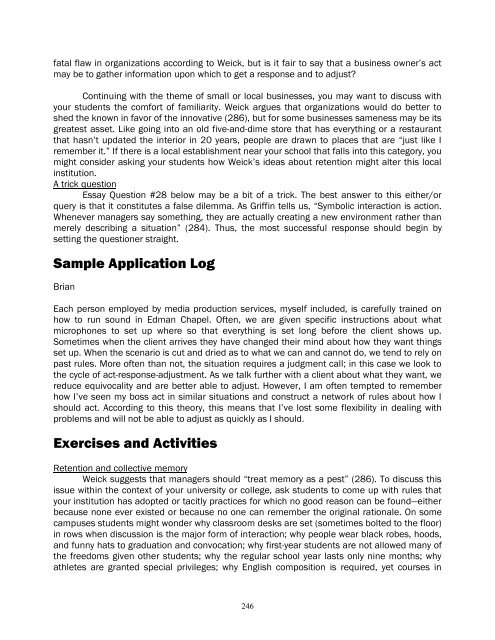Chapter 19.pdf
Chapter 19.pdf
Chapter 19.pdf
You also want an ePaper? Increase the reach of your titles
YUMPU automatically turns print PDFs into web optimized ePapers that Google loves.
fatal flaw in organizations according to Weick, but is it fair to say that a business owner’s act<br />
may be to gather information upon which to get a response and to adjust?<br />
Continuing with the theme of small or local businesses, you may want to discuss with<br />
your students the comfort of familiarity. Weick argues that organizations would do better to<br />
shed the known in favor of the innovative (286), but for some businesses sameness may be its<br />
greatest asset. Like going into an old five-and-dime store that has everything or a restaurant<br />
that hasn’t updated the interior in 20 years, people are drawn to places that are “just like I<br />
remember it.” If there is a local establishment near your school that falls into this category, you<br />
might consider asking your students how Weick’s ideas about retention might alter this local<br />
institution.<br />
A trick question<br />
Essay Question #28 below may be a bit of a trick. The best answer to this either/or<br />
query is that it constitutes a false dilemma. As Griffin tells us, “Symbolic interaction is action.<br />
Whenever managers say something, they are actually creating a new environment rather than<br />
merely describing a situation” (284). Thus, the most successful response should begin by<br />
setting the questioner straight.<br />
Sample Application Log<br />
Brian<br />
Each person employed by media production services, myself included, is carefully trained on<br />
how to run sound in Edman Chapel. Often, we are given specific instructions about what<br />
microphones to set up where so that everything is set long before the client shows up.<br />
Sometimes when the client arrives they have changed their mind about how they want things<br />
set up. When the scenario is cut and dried as to what we can and cannot do, we tend to rely on<br />
past rules. More often than not, the situation requires a judgment call; in this case we look to<br />
the cycle of act-response-adjustment. As we talk further with a client about what they want, we<br />
reduce equivocality and are better able to adjust. However, I am often tempted to remember<br />
how I’ve seen my boss act in similar situations and construct a network of rules about how I<br />
should act. According to this theory, this means that I’ve lost some flexibility in dealing with<br />
problems and will not be able to adjust as quickly as I should.<br />
Exercises and Activities<br />
Retention and collective memory<br />
Weick suggests that managers should “treat memory as a pest” (286). To discuss this<br />
issue within the context of your university or college, ask students to come up with rules that<br />
your institution has adopted or tacitly practices for which no good reason can be found—either<br />
because none ever existed or because no one can remember the original rationale. On some<br />
campuses students might wonder why classroom desks are set (sometimes bolted to the floor)<br />
in rows when discussion is the major form of interaction; why people wear black robes, hoods,<br />
and funny hats to graduation and convocation; why first-year students are not allowed many of<br />
the freedoms given other students; why the regular school year lasts only nine months; why<br />
athletes are granted special privileges; why English composition is required, yet courses in<br />
246


